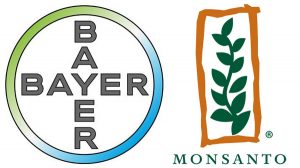12
Oct
In Bayer-Monsanto Merger, Bayer Pledges Not to Push GE Crops on Europe
(Beyond Pesticides, October 12, 2016) German chemical company Bayer said it would not introduce genetically engineered (GE) crops in Europe after its historic takeover of U.S. seed and pesticide producer Monsanto. The European Union (EU) has been skeptical of GE crops, with many countries refusing to approve certain varieties of them. However, in the U.S., where GE crops make up about half of the crops grown, the merger will probably have little to no effect on GE use.
 Last month, St. Louis-based agrichemical giant Monsanto Co. agreed to sell the company to German pharmaceutical and chemical conglomerate, Bayer, in an unprecedented $66 billion dollar deal. This takeover of the U.S. firm is the biggest ever by a German company. The combination would create a global agricultural and chemical giant ””and bring Bayer together with a leading producer of genetically engineered seeds that are engineered to resist pesticides, particularly Monsanto’s flagship product, Roundup.
Last month, St. Louis-based agrichemical giant Monsanto Co. agreed to sell the company to German pharmaceutical and chemical conglomerate, Bayer, in an unprecedented $66 billion dollar deal. This takeover of the U.S. firm is the biggest ever by a German company. The combination would create a global agricultural and chemical giant ””and bring Bayer together with a leading producer of genetically engineered seeds that are engineered to resist pesticides, particularly Monsanto’s flagship product, Roundup.
Roundup, whose active ingredient is glyphosate, is used alongside various GE crops including corn and soybeans. In 2015, the World Health Organization’s International Agency for Research on Cancer (IARC) released a landmark report naming glyphosate as “probably carcinogenic to humans.” Glyphosate’s EU license was set to expire this year, and some member states including France, Sweden, and the Netherlands objected to the renewal. A vote to reauthorize usage of glyphosate on a temporary basis failed in June 2016. However, glyphosate’s license was extended for 18 months just as it was about to expire. The next re-evaluation of the license is scheduled at the end of 2017. In the U.S., the Environmental Protection Agency (EPA) is convening a Scientific Advisory Panel next week to evaluate glyphosate’s carcinogenic potential, even though the agency is proposing to classify glyphosate as not likely to be carcinogenic.
Bayer CEO Werner Baumann was quoted Monday as telling German daily Sueddeutsche Zeitung: “We don’t want to take over Monsanto in order to establish genetically modified plants in Europe.” He added, “If politics and society in Europe don’t want genetically modified seeds, then we accept that, even if we disagree on the substance.”
This stance not to force GE on Europeans may stem from concerns from Bayer on assuming Monsanto’s tarnished reputation, which dates back to its production of the Agent Orange defoliant used by U.S. forces in the Vietnam War. According to reports, Bayer had begun discussions about whether to dump the Monsanto name upon the merger’s closing. Bayer is reportedly looking to avoid “sullying its reputation” as it is looking to expand its European operations by building consumer trust. However, Bayer also faces close scrutiny over its own pesticides —the neonicotinoids, identified as contributing to mass die-offs of bees.
The companies say that the takeover will contribute to chemical and agricultural research and eventually will help farmers to produce more food. However, critics express concerns that the merger will only tighten a monopolist grip on markets, and will lead to price increases, lack of availability of non-GE and non-treated seed, increased GE crops, and growing reliance on toxic pesticides.
The merger is not set in stone, however. Several steps must take place before the deal can be finalized. Federal regulators would have to give the go-ahead for the deal, as would the European Commission, which generally opposes the use of GE seeds, an area of specialization for Monsanto. Similarly, chemical giants DuPont and Dow Chemical are also slated to merge, with their boards of directors unanimously approved the merger of their companies through an all-stock deal, valuing the combined market capitalization at $130 billion. In February 2016, China National Chemical Corp. acquired Syngenta AG, and then cleared a major hurdle to the merger this past August when the Committee on Foreign Investment in the U.S. (CFIUS) gave the go-ahead for the merger to move forward, a deal worth nearly $43 million.
Observers say that in the long-term, markets will reveal that relying on the promotion of chemical-intensive agricultural practices is not a sustainable business practice. Chemical-intensive agriculture depends on chemical fertilizers and toxic pesticides that have been shown to reduce soil organic matter and decrease the diversity of soil biota. These chemical inputs contaminate waterways, leading to eutrophication and “dead zones,” where nothing is able to live or grow. Sustainability advocates say that the only way that the agricultural industry can create a sustainable business model is to produce products that are compatible with organic agriculture.
If you oppose the Bayer-Monsanto merger, please consider reaching out to your Senators or Representative to ask them to reject the approval of a merger that consolidates seed availability, and encourage them instead to focus on increasing the availability of organic seeds, which do not negatively affect soil, water or human health.
All unattributed positions and opinions in this piece are those of Beyond Pesticides.
Source: RT










